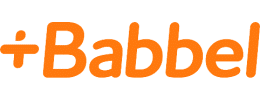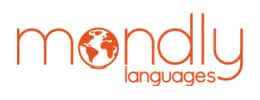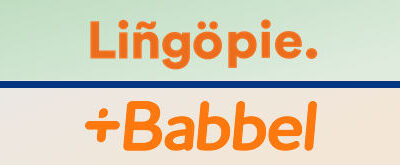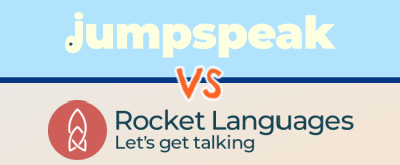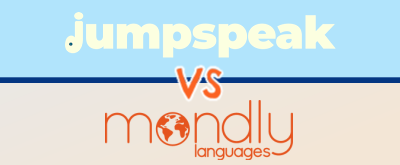Mondly and Babbel are similar in several respects, which is likely why people often have such a hard time deciding which one to choose to help them learn a new language. In this article, we highlight the major differences between these two companies so you can make a decision as to which is best for you.
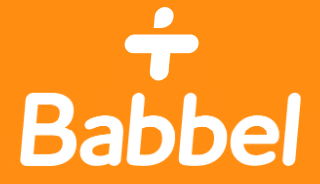
Sale: 60% OFF
Applied in Cart
|
$8-$15/mo |
The perfect app for beginners and budget shoppers. A great course with quick lessons and foundational content to take you to conversational fluency. |
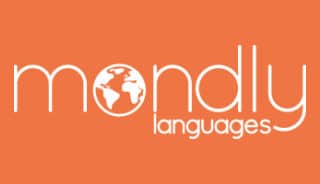
Sale: 50% OFF
Applied In Cart
|
$4-$10/mo |
A great app for beginners and vocab acquisition. Similar to Babbel in many respects, including quick-hit lessons, but not as in-depth. |
Video: Which Language App Is Best?
In the video above, Bianca from the Guide2Fluency team compares the language learning apps from Babbel and Mondly.
Editor’s Choice
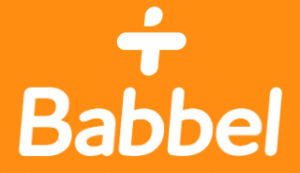
Babbel
- Multiple Subscription Options
- 20-Day Money Back Guarantee
Pros
- We prefer Babbel’s learning framework (more advanced)
- Helpful grammar instruction layered into lessons
- Lessons are more well-rounded than Mondly’s (content delivered in several ways)
- Top-notch speech recognition technology
- Daily review and recap session drives home language retention
Cons
- A little more expensive than Mondly
- Only 14 languages available
How Both Language Apps Work
At first glance, these two language learning apps have a ton of similarities (well beyond the simple fact that they both have orange logos). Both have shorter, modular lessons and very clean user interfaces. But there are many more differences than you may think. Before getting into what we liked and didn’t like about these two apps, let’s briefly discuss how each works.
Mondly
When you first log in to the Mondly app, you land on the dashboard, which looks like a giant map covered in geolocation pins.
It’s a little busy and overwhelming at first, but in reality, it’s fairly simple. Each geolocation pin is just a collection of eight lessons that covers a specific topic or theme.
For example, some pins cover travel, romance, art, and food. However, the interesting thing is that you don’t just work through these geo pins one lesson at a time.
In addition to these lessons, there’s always one daily lesson. This is sort of the baseline of the Mondly program. Every single day you’re given a daily lesson to complete, and when you finish it, it will be marked off on the dashboard, and a countdown clock will start counting down until the next day’s daily lesson is ready.
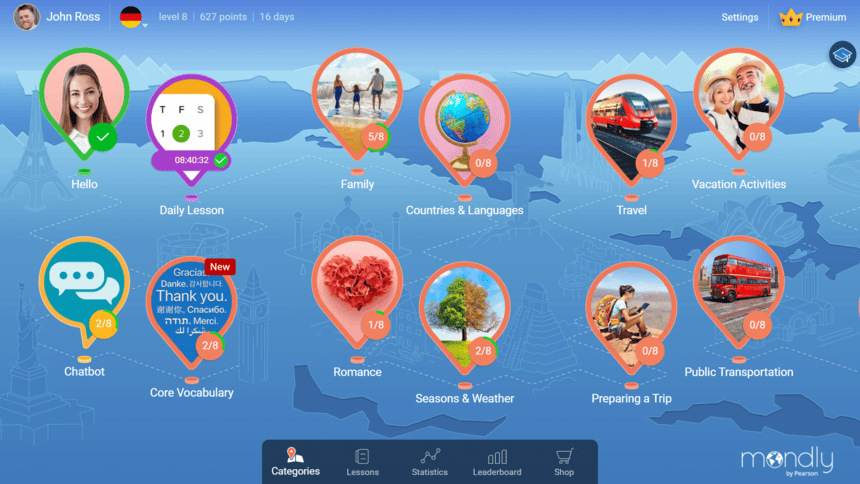
The daily lesson is the backbone of the Mondly program. You do one every single day, and then you can work the more thematic lessons in the geolocation pins on the dashboard as you want.
Regardless, as for the what the actual lessons themselves are like (both the daily lessons and the lessons from the map), they’re all basically the same in terms of length, format and content.
Each Mondly lesson takes around 5 minutes to complete and is comprised of a series of hands-on, rapid fire drills. To name a few, there are flashcard drills, fill-in-the-blanks, speaking drills, translation exercises, matching pairs, back-and-forth mock conversations, spelling drills, and a few more. Essentially, each lesson is built on fast-moving, highly diverse exercises.
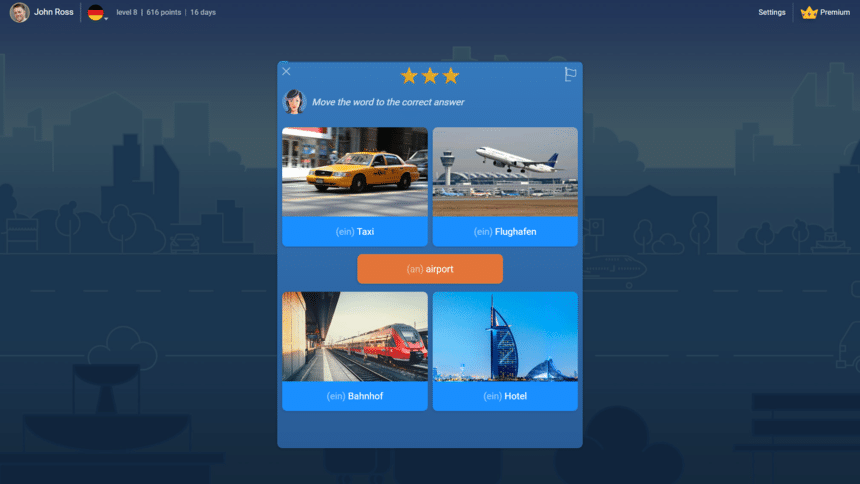
When the lesson is over, Mondly gives you a quick recap of the vocabulary you learned in the lesson in rapid succession, and then a quick snapshot of your performance data.
Beyond this, there isn’t much. There are some weekly quizzes and monthly challenges, as well as upgraded features like VR and AR apps, but if you look at the core program, it’s fairly simple. You work your 5-minute daily lesson, get a little review and recap, and then you’re free to knock off other lessons on the map if you want.
Babbel
The Babbel program is fairly different from the setup Mondly uses. Rather than landing on a map where you can kind of cherry pick what lessons to do, Babbel uses a pretty linear learning path.
Everyday when you log in, you are prompted to do a quick spaced review of vocabulary you’ve already learned, then you jump into the next lesson on the path.
As for what the Babbel lessons are like, each one is generally a little longer and more comprehensive than a typical Mondly lesson.
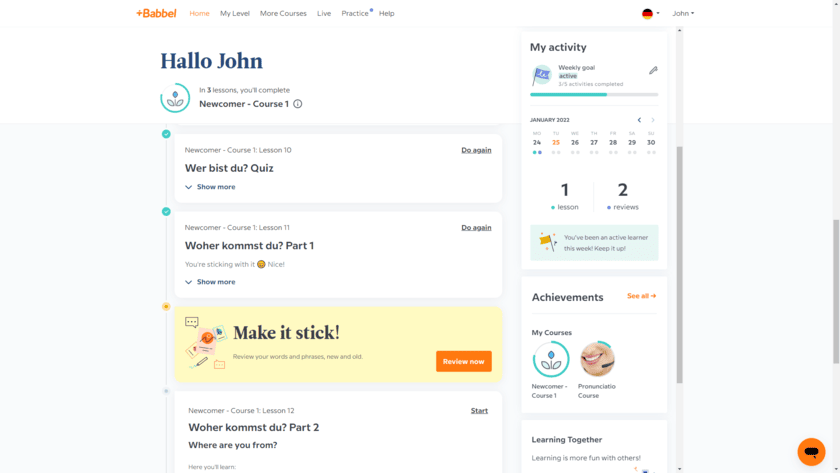
Though the Babbel lessons contain many of the same fast-moving, blended exercises (such as listen-and-repeat exercises, digital flashcards, fill-in-the-blanks, matching pairs, matching phrases to images, and completing mock conversations), each lesson is longer.
A Babbel lesson generally takes about about 15 minutes to complete, which is roughly three times longer than an average Mondly lesson. The Babbel lessons are primarily a little bit longer because Babbel layers grammar instruction directly into the lessons (similar to Busuu).
With Mondly, there is no direct grammar instruction in the program—just quick-hit, interactive exercises focused on vocab acquisition.
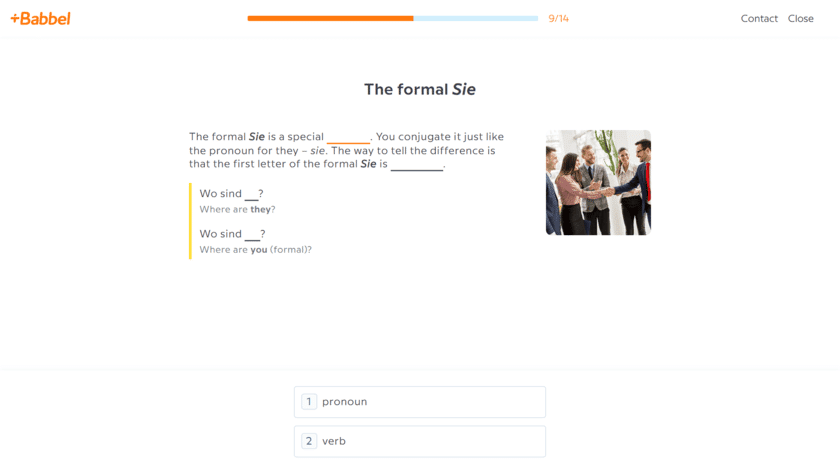
With Babbel though, each lesson is more fulsome because you get the same hands-on drills plus direct teaching points about grammar and other important issues. Babbel mixes in these points through direct teaching slides, as well as intermittent callout boxes throughout the exercises.
In short, both companies use rapid fire exercises as the basis of their lessons, yet, while Mondly lessons are a little tighter and cut out grammar, Babbel leans on the grammar a little harder and their lessons are a little longer as a result.
Cost Comparison
Before I get into the details of what I like and don’t like about each language app, let’s quickly talk pricing.
Mondly has three different packages to choose from:
- Pay-as-you-go monthly package = $10 per month
- 12-month subscription = $48 per year ($4 per month)
- Lifetime access package = under $100 after discounts
Babbel has a pretty similar model with 3-month, 6-month and 12-month subscription plans, all ranging from around $6 to $12 per month depending on the package and discounts. Plus, similar to Mondly, Babbel also has a lifetime plan, which includes access to all Babbel languages for $300.
Thus, Mondly is cheaper than Babbel by a few dollars per month. It’s not a huge price disparity (perhaps $4 to $10 per month), but that might be enough to make a difference to some people.
Yet, no matter which company you go with, I would encourage you to check for sales and coupons before buying. We track both companies’ sales calendars and they’re both almost always running some sort of deal or special promotion.
Reasons To Choose Babbel
Let’s next discuss some of the reasons why Babbel may be the better fit for you.
Review Functionality
The first strength of the Babbel program is vocab review. To be clear, both companies have review functions, but in my opinion, Babbel’s is much better than Mondly’s.
On the surface, Mondly’s vocab review tool looks really cool. It takes the form of a brain graphic, with little clusters of words connected by neural links. It looks really neat.
The words are all grouped by topic, and you can dive in to look at old vocabulary you’ve learned. It’s very sleek.
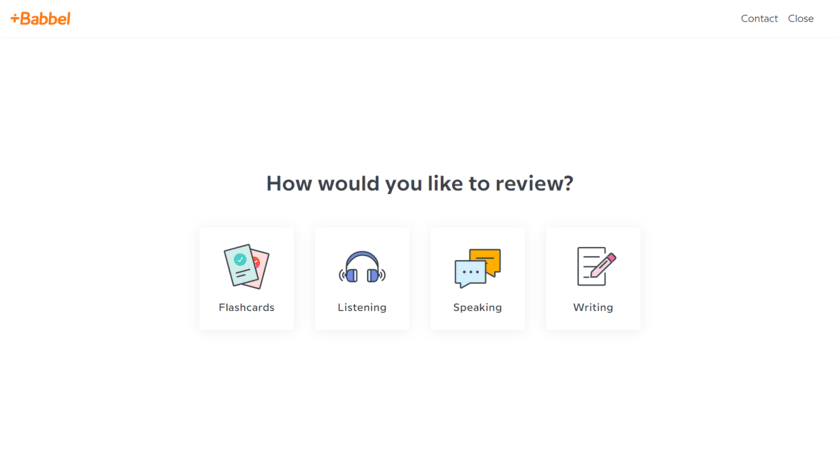
However, despite the cool appearance, the Mondly brain review tool just isn’t that practical. Reviewing vocab is totally self-driven, and there are no labels on any of the brain clusters to identify what you’re reviewing. There’s just no rhyme or reason to it, and that kind of bugged me.
With Babbel, however, everything is very purposeful. Every day when you log in, they give you a spaced review. The words you’re reviewing are sequenced at lengthening intervals so they stick.
Plus, you get to choose how you want to review—listening, flashcards, speaking, or writing. It’s a very effective review framework.
Grammar Instruction
The next thing about Babbel’s program that I prefer to Mondly is Babbel’s focus on grammar. As noted above, Mondly really shies away from the grammar. They do offer linked verb conjugation charts, which are useful, but otherwise, it’s on you to pick up grammar intuitively.
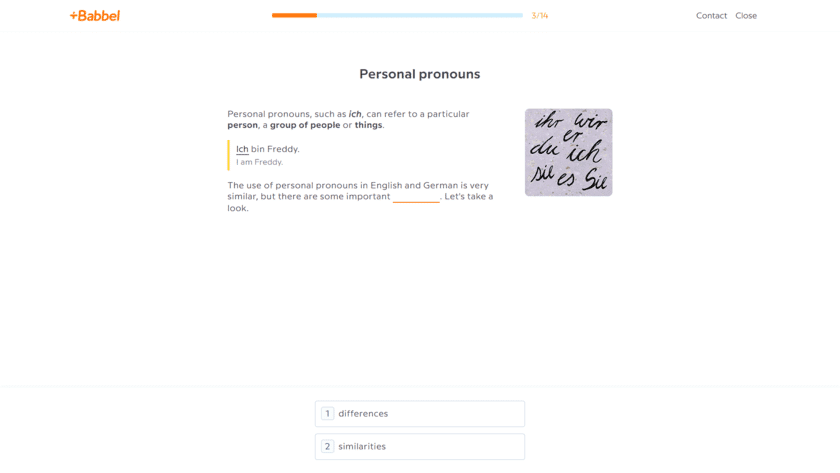
In contrast, Babbel is much more holistic in giving you coverage on both vocab and grammar. The reality is that you can’t become proficient in a new language without both of these elements, and Mondly is just light on the grammar side. If you only need vocab, or if you learn more intuitively (without the need for direct instruction), then Mondly is perfect for that.
However, if you’re trying to learn a new language from scratch, you’re going to need a strong mix of both elements, in which case Babbel is superior.
Progression of Lessons
The third and final advantage of the Babbel app is lesson progression. Babbel is really good about starting with one- and two-word building blocks, and working up from there.
They bring you along slowly as a beginner and focus on fundamentals, before advancing to longer sentences and conversations.
In direct opposition, Mondly just throws you right in. Rather than warming up with the easy stuff and building up to more advanced vocab and sentence structures, they just start you off with learning full sentences.
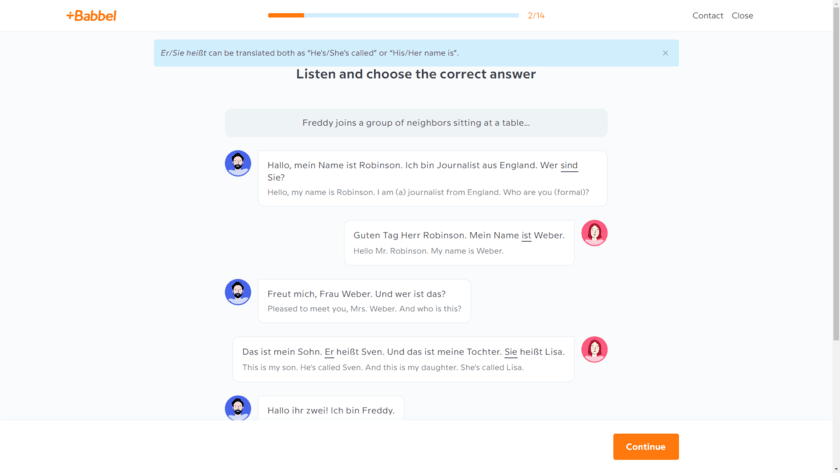
There is an ever so slight warm up with basics in the first two or three pins on the Mondly map, but beyond that, you’re just tossed in.
If you have some basic understanding of the language you’re learning, you’ll be fine. But if you’re a complete beginner, I personally think Babbel gives you a stronger base from the get-go.
👉 Read our review of Babbel here
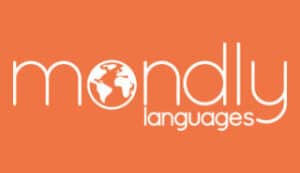
Mondly
- 40+ Languages
- AR & VR Apps
Pros
- Quick, engaging lesson format (lessons take just 5-10 minutes)
- Affordable subscription options (as low as $4 per month)
- Easy-to-use digital platform
- Bonus AR and VR apps that are super fun
- Lesson recaps increase retention and engagement
Cons
- Program overall isn’t as comprehensive as Babbel’s app
- Lessons are light when it comes to conversational practice
- Grammar instruction is somewhat limited
Reasons To Choose Mondly
Next, let’s discuss the reasons why Mondly may be a better fit for you.
Lesson Recaps
The first highlight of the Mondly program that I want to note is how they give you a quick recap at the end of every lesson.
Essentially, when you complete a Mondly lesson, they quickly run you through a review session where they recap each word or phrase learned in that unit.
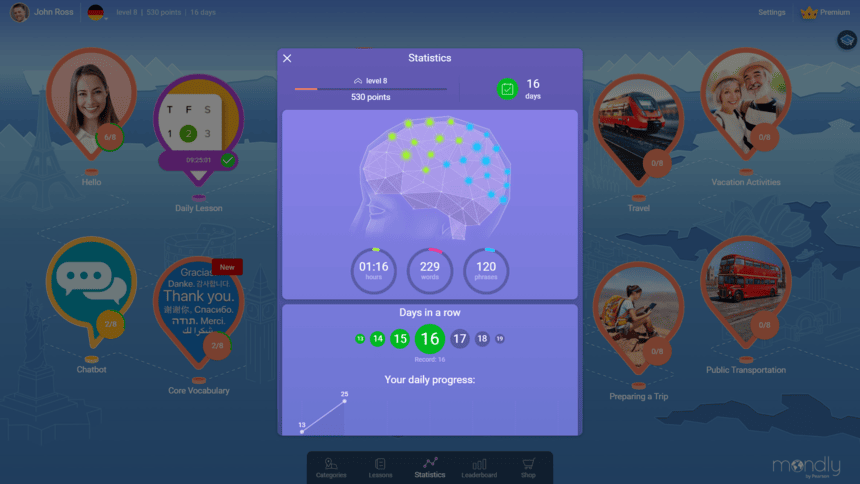
There are usually around 10 to 15 key phrases, and Mondly will run through them in under 30 seconds. This rapid fire review is a nice way to drive home what you learned.
I think Babbel would be smart to add a quick recap like this at the end of their lessons.
Diverse Practice Drills
Another highlight is the fun, diverse mixture of drills that Mondly uses. Babbel has a pretty nice mix of exercises as well, but Mondly’s drills are more diverse and keep things fun and engaging.
There are flashcard drills, fill-in-the-blanks, speaking exercises, translation prompts, matching pairs, back-and-forth text-based dialogues, spelling drills, and a few more. It’s a really solid blend of hands-on drills that increases engagement with the program.
Fast-Paced Lessons
Lastly, I enjoyed how fast the Mondly lessons move. This can be a good thing or bad thing depending on what you’re looking for in your program, but for a lot of people, these short, bite-sized lessons will be a good fit.
Your daily lesson only takes 5 minutes, and if you care to squeeze in a couple more topical lessons throughout the day, those only take 5 minutes each as well.
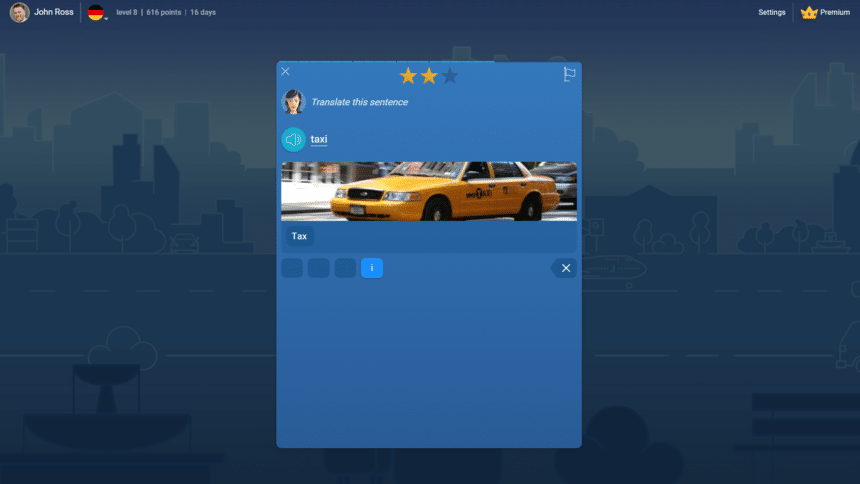
In contrast, a Babbel review alone takes almost 5 minutes, and then there is still the 15-minute lesson on top of that. Thus, you’re looking at about 20 minutes of learning per day with Babbel.
From this perspective, if you’re looking for consistency day-to-day with shorter, bite-sized lessons rather than depth or time studying, Mondly will be more manageable (regardless of whether you are learning French, Italian, or German).
Verdict: Babbel or Mondly?
After using both language apps for some time, I do really like both; however, if I could only pick one, I would personally go with Babbel. I found their program to be more well-rounded with its inclusion of grammar teaching points, and I like the structure better as well.
Babbel starts with the building blocks, and then keeps you on a linear path, working your way up from there, progressing everyday.
With that said, I do think some people might benefit from using Mondly over Babbel. Specifically, if you already have a starting basis in the language you’re learning, or if you’re looking for shorter, bite-sized lessons each day, Mondly may be superior.
Otherwise, if you’re starting from scratch and have time for 15-minute lessons each day, I would go with Babbel. I’m a big fan of their language learning program.
Babbel’s lessons are more comprehensive and include helpful grammar instruction, while the Mondly lessons are shorter and focus more on learning new vocabulary. In other words, Babbel takes a more holistic approach to language learning, while Mondly is more about building out your vocab base.
After testing each program, our team believes Babbel offers the more complete and effective language courses, especially if your goal is to reach an intermediate or advanced level of fluency. The Mondly lessons are fun and engaging, but ultimately do not reach the advanced levels.
The subscription plans from both companies are very affordable, however, Mondly is technically the cheaper option. Their subscription plans reach as low as $4 per month (after discounts), while the cheapest we have seen Babbel offered is $6/month.

